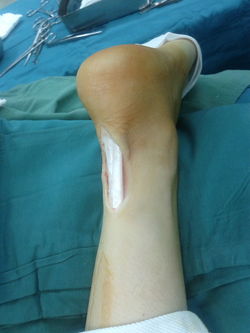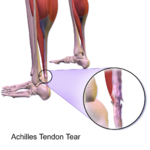Achilles tendon injury
What is an Achilles Tendon?
An Achilles tendon is a strong resilient band that connects the calcareous to the calf muscle. You use your Achilles tendon in everything you do that involves using your feet; without it, you wouldn't be able to walk. The Achilles tendon is one of the largest tendons in your body. Many Achilles tendon injuries are caused when the tendon becomes swollen and painful, or by tendinitis. In the most severe Achilles tendon injuries. Even though the tendon can tolerate more than 1000 pounds of force, too much force on the tendon can cause a partial Achilles tendon tear, or even, a complete Achilles tendon rupture, which is when the tendon is torn completely .Achilles injuries most often occur when pushing off of the foot, such as when jumping or accelerating, which creates force or stress on the tendon. People are more likely to get an Injury by sudden movement, For instance, at the start of a race when you take your first push and step. [1]
Achilles Tendon Injuries
There are many types of Achilles tendon injuries that can happen on a daily basis such as tennis leg which is a complete tear, rupture, or even a stretch between the calf and the Achilles, which is what Kobe Bryant suffered from while playing the Golden State Warriors in 2013. A few things that can cause an Achilles tendon Injury is; overuse, using high heels which increases the tension on the tendon, and even is the muscles and other tendons around the Achilles are too tight. The most common Achilles Tendon Injury is Achilles tendinosis. Achilles tendinosis is a soreness and stiffness that creeps on you and continues to get worse until you get it seen by a doctor. It often starts with it being stiff and creaking when you first get out of bed in the morning. If you lightly pinch your tendon and fell soreness then that is one of the indicators that something's wrong. If there is tenderness, stiffness, or if you hear a snap in the lower portion of your leg then you should go it it checked out. Another type of Achilles tendon injury is a Midpoint Achilles tendon injury. Although this type is not as common it is still good to know what it is. A Midpoint Achilles injury is an injury that happens at the bottom of the Achilles tendon rather than in between the calf and the actual Achilles. This type of injury is not as common.
There are lots of symptoms that can pop up when diagnosing an Achilles tendon injury like; If you hear a snap, crack or popping sound when pushing off with your leg, then followed by a sharp pain in the back of your leg or ankle, You have trouble moving your foot while walking up the stairs, non ability to be able to stand on your tippy toes, or even just a slight bruise or little pain in the back of your heel. These are all common symptoms of an Achilles injury and you should get it treated ASAP. There are many, many type of Achilles injuries but its most common to stage them in numerical order. Stage one which is a partial tear. This type is very common around all athletes. You might not notice a partial Achilles tear because it is not as recognizable as a complete Achilles rupture. You wont know that you have a partial tear until after you cool down from the activity. Sage two which is a Complete tear or rupture. This stage is the most severe stage, a total Achilles rupture will be more blunt, you will likely notice it at the moment that the injury occurs. You wont be able to walk and will be in excruciating pain. [2]
How to Cure
You can treat your rupture at home for a short time if you have either a stage on or two. If you have a stage two you immediately want to see a doctor but if you have to wait a day or so you can treat it at home for a short period of time as well. Achilles tendon injuries should not be taken lightly it can end any range of athletes career in a split second so you should see a doctor ASAP. You can take aspirin, Ibuprofen, and Tylenol to kill the pain. It’s important to follow the instruction of the doctor regarding the use and time frame of these medications. Over use of these over the counter medicines can lead to more serious damage to the body and make the pain worse. It is important to talk about taking care of your whole body as well, you should drink water daily and eat a good variety of nutrients daily. If you fill you body up with junk, you are more prone to injury's because your body becomes weak and not stable. [3] [4]
Video
Video of everything you need to know about an Achilles tendon tear
References
- ↑ Steven S. Bhimji.[1]medicinenet. Web. Accessed November 10, 2016.
- ↑ Chitra Badii and Elizabeth Boskey. Achilles Tendonitis Phttp://www.healthline.com. Web. August 25, 2016. (last modified, accessed.).
- ↑ Fullem, Brian. Owner's Manual: Treating and Recovering from Achilles Injury Runners World. Web. Published FEBRUARY 2, 2008.
- ↑ Fitzgerald, Matt. [2] http://running.competitor.com/. Novemebr 20th, 2013( date of publication)
| ||||||||||||||||||||


